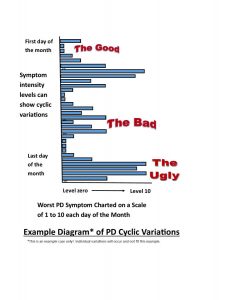Human Clock-swapping: The Good, the Bad, and the Ugly

I hate the bad days, and what I have to say about the ugly ones is not fit for print. But the good days — well, they are delightful. I write these columns during those times.
It’s not about “Jekyll and Hyde” mood swings, but about days where the PD symptoms present themselves as only a minor problem (the good), days when it’s a struggle to function well (the bad), and then days when the symptoms are the most disabling (the ugly). There may be a cyclicity to the good, the bad, and the ugly (see diagram, below). John D. Palmer, author of “The Living Clock,” writes about this cyclicity, saying that we are all governed by a human clock.
Sleep is governed by the human clock, and sleep disturbances are common with PD. Having the strong desire to go to bed when the sun is shining, and to stay awake when it is not, is the human clock swapping day for night. Think of a serious case of jet lag. But it is not just the sleep cycle function of the human clock that is swapped. With PD, there are many human biological cycles in which the normal is swapped for the abnormal.
Connect with other patients and share tips on how to manage Parkinson’s Disease in our forums!
I used to get up in the morning, jump right into projects, and go all day (16 hours). This energy helped me get four college diplomas. This is no longer the case. Those days have been swapped out for a daily cycle of times when the body and mind are available, and times when they are not (off-periods). Each day has at least three off-periods, with the one in the evening being the worst. Then, there are bad days when the off-periods are longer and more intense. In the middle of these bad days, there will be some time when it’s just plain ugly and I am bedridden. The normal human cycle of daily life has been swapped out for this PD cycle of the good, the bad, and the ugly.
Charting aspects of how PD is experienced, using a numerical scale from 1 to 10, and putting that on a calendar each day can be quite useful in getting to know your personal cycles. You can chart pain, fatigue, tremors, or any other symptom that is significantly interfering with your quality of life.
Charting can also help you to become more aware, and maybe even get to the point in which you can say to your partner “it feels like a bad day is right around the corner,” or “today is a level 5 day.” The other piece of information that comes from charting is an idea of how long it will be until the good days return. They do return, and it helps to have an idea of when that will be when you’re in the middle of the torture that accompanies the bad and the ugly days.
Communication about the good, bad, and ugly days is important for healthy relationships with family and caregivers. Using a numbering system of 1 to 10 communicates to others how the day is unfolding so that adjustments can be made. Using this system can prompt a family member to ask: “What’s your level today?” Sometimes a descriptor helps in communication, like “What’s your pain level today?” This communication helps you to adjust plans for the day and helps to put in place any compensatory strategies during the bad days. It makes life easier on everyone.
I hate bad days, and ugly ones even more, but here’s the problem: Exaggerated emotions are fuel for the bad days. Drop the anger and replace it with a practice of mental centering, even during the worst of it. I will write more on this in the columns to come. I can’t end the PD-caused human clock-swapping, but with a good rehab plan in place, I am learning how to balance the swap in my favor.
***
Note: Parkinson’s News Today is strictly a news and information website about the disease. It does not provide medical advice, diagnosis or treatment. This content is not intended to be a substitute for professional medical advice, diagnosis, or treatment. Always seek the advice of your physician or another qualified health provider with any questions you may have regarding a medical condition. Never disregard professional medical advice or delay in seeking it because of something you have read on this website. The opinions expressed in this column are not those of Parkinson’s News Today or its parent company, Bionews Services, and are intended to spark discussion about issues pertaining to Parkinson’s disease.









John W Grantham
I am a PD patient diagnosed 2 years ago & have been trying to figure out my cycles & how to deal with them. This is a great idea. I need some way to give an "early warning" to my spouse & I hope that keeping a calendar will give me a better idea of the timing of my "off" episodes.
Stephen Duffield
So True, Regs Stephen The Parky Park Runner
Andrea
Ahhhhhh,but what about throwing into the equation stress and anxiety issues unplanned?
Dr. C
And don't those unplanned things always happen (argh#@%!). Stress comes in many packages - a good topic for a future column. Thanks.